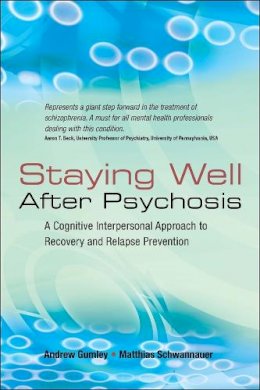
Staying Well After Psychosis: A Cognitive Interpersonal Approach to Recovery and Relapse Prevention
Andrew Gumley
Staying Well After Psychosis is extremely readable, based on solid research evidence and packed full of clinical insights and strategies that will satisfy any clinician seeking innovative approaches to the promotion of recovery from psychosis.
Anthony P. Morrison, Professor of Clinical Psychology, University of Manchester, UK
Over the past decade our understanding of the experience of psychosis has changed dramatically. As part of this change, a range of psychological models of psychosis and associated interventions have developed.
Staying Well After Psychosis presents an individually based psychological intervention targeting emotional recovery and relapse prevention. This approach considers the cognitive, interpersonal and developmental aspects involved in recovery and vulnerability to the recurrence of psychosis.
Andrew Gumley and Matthias Schwannauer provide a framework for recovery and staying well that focuses on emotional and interpersonal adaptation to psychosis. This practical manual covers, in detail, all aspects of the therapeutic process of Cognitive Interpersonal Therapy, including:
- Taking a developmental perspective on help seeking and affect regulation.
- Supporting self-reorganisation and adaptation after acute psychosis.
- Understanding and treating traumatic reactions to psychosis.
- Working with feelings of humiliation, entrapment, loss and fear of recurrence.
- Working with cognitive interpersonal schemata.
- Developing coping in an interpersonal context.
Clinical psychologists, psychiatrists and mental health professionals will find this innovative treatment manual to be a valuable resource in their work with adults and adolescents. This book will also be of interest to lecturers and students of clinical psychology and mental health.
Product Details
About Andrew Gumley
Reviews for Staying Well After Psychosis: A Cognitive Interpersonal Approach to Recovery and Relapse Prevention
